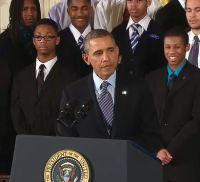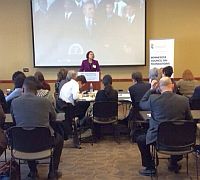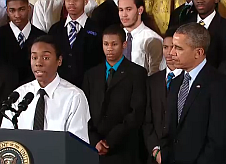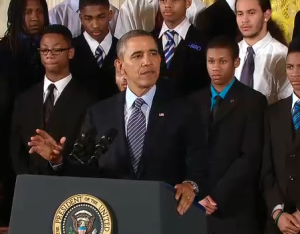MCF President Trista Harris and David Nicholson, executive director of the Headwaters Foundation for Justice, were among the philanthropic leaders present at the White House on February 27 when President Obama launched the My Brother’s Keeper initiative to address persistent opportunity gaps faced by boys and young men of color. There has been movement on this initiative, nationally and closer to home.
In Minnesota, at least 22 funders will participate in a statewide My Brother’s Keeper learning table coordinated by MCF. The group will provide a local connection to the work being done nationally and give funders an opportunity to learn from each other on what’s working here.
The local group will focus on the milestones identified by Obama’s task force and summarized below. In Minnesota, the initiative will focus on the Twin Cities, as well as on boys and men of color throughout Greater Minnesota — an aspect that distinguishes it from efforts in many other states.
White House staff will travel to Minnesota to meet with locally-involved funders in June. (The meeting will take place June 17, at 11 a.m., details here.) If your organization is not included in this list, but you are interested in joining the My Brother’s Keeper learning table, please contact Alfonso Wenker, so we can keep you informed. There is still time for your foundation to get involved!
Minnesota funders working on My Brother’s Keeper include:
- Blue Cross and Blue Shield of Minnesota Foundation
- Bush Foundation
- Carlson Family Foundation
- City of Minneapolis
- General Mills Foundation
- Greater Twin Cities United Way
- Headwaters Foundation for Justice
- Hennepin County
- The Liemandt Foundation
- LISC Twin Cities
- The McKnight Foundation
- The Minneapolis Foundation
- Minnesota Department of Public Safety
- Minnesota Philanthropy Partners
- The Mortenson Family Foundation
- Nexus Community Partners
- Northside Funders Group
- Pan African Community Fund
- The Jay and Rose Phillips Family Foundation of Minnesota
- Saint Paul Public Schools Foundation
- United Health Foundation
- Wells Fargo Foundation Minnesota
- Xcel Energy Foundation
- Youthprise
National Recommendations
Nationally, task force members assessed programs and policies with the potential to enhance positive outcomes and eliminate or reduce negative ones. A 90-day progress report sent to President Obama included recommendations based on six key milestones that are especially predictive of success in life and that can provide timely opportunities for intervention. Also identified were “cross-cutting” areas of opportunity that span the milestones.
Cross-cutting Areas
- Establish national indicators that “see” the problems and track progress.
- Provide incentives to learn and do what works.
- Support comprehensive cradle-to-college-and-career strategies rooted in local communities, realizing there is not a “magic formula for success.
- Recognize the importance of parents and other caring adults.
Six Key Milestones and Recommendations
1. Enter school ready to learn
- Close the word gap and support enriched home environments
- Ensure access to high-quality care and education
- Implement universal early health and development screenings
- Eliminate suspensions and expulsions in early-learning settings
2. Read at grade level by third grade
- Support joint book reading and at-home literacy
- Bring successful evidence-based practices to scale, starting with early literacy screenings
3. Graduate from H.S. ready for college and career
- Maintain momentum in turning around the worst-performing schools
- Help schools and families recognize early warning signs and take action
- Encourage the use of fair discipline practices
4. Complete post-secondary education or training
- Expand access to AP/IB courses and rigorous college prep
- Improve college advising services and support tools
- Aim higher in H.S. by encouraging FAFSA completion and post-secondary applications
5. Successfully enter the workforce
- Enact broader growth and opportunity agenda
- Increase entry-level job, mentorship and apprenticeship options
- Help grow and improve summer jobs initiatives
6. Reduce violence and provide a second chance
- Reduce violence in high-risk communities by integrating public health approaches
- Encourage law enforcement and neighborhoods to work hand-in-hand
- Reform the juvenile and criminal justice systems to keep youth on track
- Eliminate unnecessary barriers to reentry and encourage fair chance hiring options
Learn more about My Brother’s Keeper on the White House webpage.
– Susan Stehling, MCF communications associate




 Posted by MCF Webmaster
Posted by MCF Webmaster 







